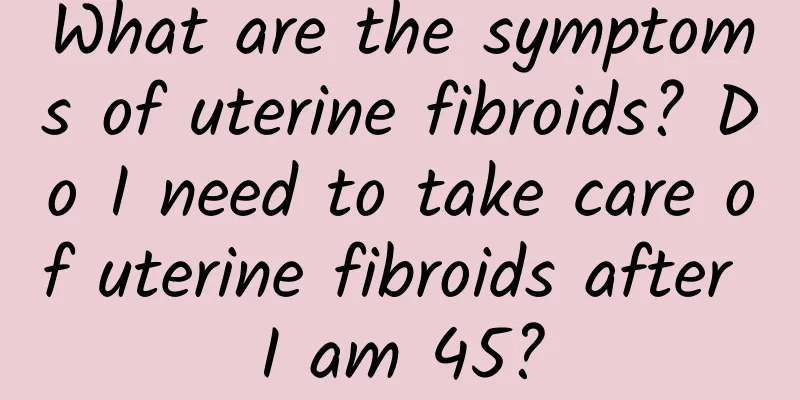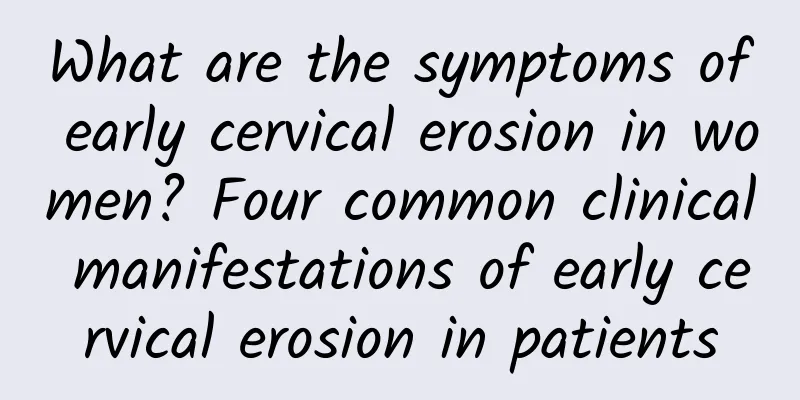What are the symptoms of uterine fibroids? Do I need to take care of uterine fibroids after I am 45?

|
What are the symptoms of uterine fibroids? Uterine fibroids are common benign uterine tumors in women, and their appearance may cause some potential problems for women's health. Knowing the precursor symptoms of uterine fibroids is crucial for early diagnosis and treatment. This article will introduce some common precursor symptoms of uterine fibroids and answer the question of whether you need to pay attention to uterine fibroids after the age of 45. Uterine fibroids are lumps that grow in the wall of a woman's uterus. They can appear alone or in groups. Uterine fibroids are usually benign, but sometimes they can become malignant, so early detection and treatment are critical. Symptoms of uterine fibroids can vary depending on their location, size, and number. Here are some common symptoms of uterine fibroids: 1. Abnormal menstruation: Uterine fibroids may cause excessive menstrual flow, prolonged menstrual periods, or shortened intervals between periods. Excessive pain, dysmenorrhea, and blood clots may also be symptoms of uterine fibroids. 2. Pelvic pressure: The growth of uterine fibroids may cause pelvic discomfort or pressure. Some women may experience back pain, frequent urination or difficulty in defecation. 3. Abdominal lumps: When uterine fibroids grow to a certain extent, one or more abdominal lumps may be felt when touched. These lumps are usually round and movable. If you experience the above symptoms, then there is a high chance that you are experiencing the precursors of uterine fibroids. It is very important to consult a doctor as soon as possible, as they can confirm the diagnosis based on your symptoms and physical examination. For women over 45 years old, do they need to pay attention to uterine fibroids? Age is not a reason not to pay attention to uterine fibroids. The occurrence of uterine fibroids is somewhat related to age, but it does not mean that you don't have to worry about it after the age of 45. In fact, the older you are, the higher the risk of uterine fibroids. More importantly, the development of uterine fibroids may have some adverse effects on women's physical health, such as menstrual disorders, anemia, infertility, etc. Therefore, no matter how old you are, women should pay attention to and detect uterine fibroids early. If you find that you have the precursor symptoms of uterine fibroids, you should consult a doctor as soon as possible and receive appropriate treatment. Doctors may use observation, drug therapy or surgery to treat uterine fibroids. The specific treatment plan needs to be determined according to individual circumstances. In short, the precursor symptoms of uterine fibroids include abnormal menstruation, pelvic pressure, and abdominal lumps. Although the risk of uterine fibroids increases after the age of 45, age does not mean that uterine fibroids do not need to be paid attention to. Regardless of age, women should pay close attention to their bodies and seek medical attention in time if they find abnormal symptoms. This way, uterine fibroids can be detected and treated earlier and their health can be protected. |
Recommend
Fight obesity in summer by eating cooling fruits! Traditional Chinese Medicine teaches you how to eat fruit to lose weight
In the summer when the sun is scorching, if you w...
Does intermittent fasting increase the risk of cardiovascular death? Huang Xuan: Two risk groups should avoid intermittent fasting
The rise in global obesity rates has attracted wi...
What should I do if there are blood clots during menstruation that cannot be discharged?
What should I do if there are blood clots during ...
Leek juice and brown sugar drink is effective in relieving dysmenorrhea symptoms
Dysmenorrhea is a common disease that troubles wo...
How to diagnose bacterial vaginosis
Many women will suffer from gynecological disease...
Why do uterine fibroids grow larger during pregnancy? Will uterine fibroids during pregnancy affect the fetus?
Why do uterine fibroids grow during pregnancy? Th...
Can ovulation bleeding be cured?
Can ovulation bleeding be cured? During ovulation...
Menopause physical therapy price
The cost of menopause treatment is of concern to ...
Research progress on hyperprolactinemia
When it comes to hyperprolactinemia, many people ...
What medicine to take for abdominal inflammation and pelvic inflammatory disease
If there are obvious symptoms of peritonitis and ...
Experts analyze the common causes of cervical hypertrophy for you
As people conduct in-depth research on gynecologi...
Will frequent abortions affect fertility?
Abortion is the abbreviation of artificial aborti...
How to diagnose pelvic inflammatory disease
Diagnosis of pelvic inflammatory disease: There a...
What are the reasons why menopause is difficult to cure?
Menopause is something that every female friend w...
Experts explain the common causes of pelvic inflammatory disease
The cause of pelvic inflammatory disease is the f...









